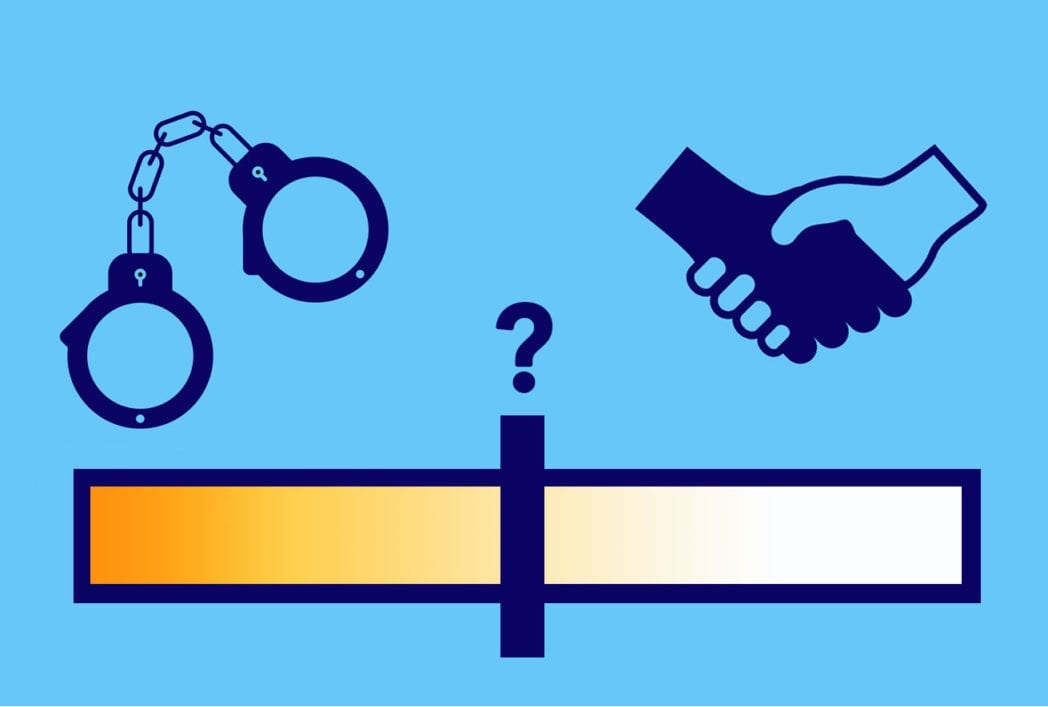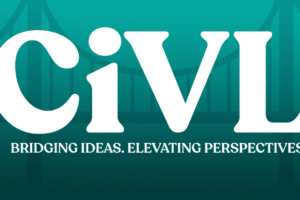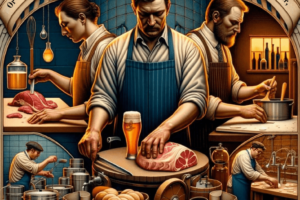Types of authoritarians
There are three general categories of authoritarians…
- Left-authoritarians
- Right-authoritarians
- Populists
Those who advocate the most state control over people divide into two groups on the Left and Right near the bottom of the chart on the World’s Smallest Political Quiz. Communists, National Socialists, and Fascists are on the Left. Monarchists and military dictators are on the Right. The populists advocate slightly less state control and are therefore closer to the center of the chart.
The left-authoritarians
The fact that national socialists and fascists are on the Left is not well understood by most people, including most academic political scientists. But it is very clear that Hitler and the other top Nazis thought of themselves as socialists, and the word socialist is right there in the name of the party. The Nazis also did a great many things that were consistent with the policies we normally think of as socialist.
Likewise, the Italian Fascist Party was an offshoot of the Italian Socialist Party. Mussolini wanted a version of socialism that put Italy first.
The big difference between National Socialism and Fascism on the one hand, and Communism on the other, is that the latter is internationalist in its outlook while the former parties are more nationalistic. Whereas the Communists shouted “Workers of the world unite!” the Nazis shouted, “Germany awake!” Whereas the Communists wanted world revolution, the Nazis were only interested in having a socialist Germany that ruled vastly more territory.
Other differences were mostly cosmetic. The Communists took ownership of all businesses while the Nazis and the Fascists preferred to leave nominal private ownership in place while taking control of how those businesses were run. When asked why he didn’t nationalize the big businesses, Hitler replied, “We don’t need to, we have nationalized the people.” As a practical matter, business owners weren’t allowed to make any decisions in their own companies. All decisions were made by the party leaders who were the heads of the nationalized union. This created real socialism while retaining the illusion of private ownership.
The Right-authoritarians
To the right of the National Socialists, Fascists, and Communists in the lower part of the authoritarian sector are the monarchists and the military dictators.
There are very few monarchists left in the world, but once upon a time they had an elaborate ideology to justify personal rule based on a supposed “divine right of kings.” They discovered this divine right by selectively quoting the Bible. Today, most monarchists are simply people who like to keep a figurehead king or queen alongside democratic institutions that have the real power. There are many monarchists of this type in Great Britain, for instance, and none of them are authoritarians (probably). The monarchist brand of authoritarianism is dead. Czar Nicholas ii of Russia was probably the last major example.
By comparison, military dictators dispense with the divinity part, and either rule with simple brute force and/or attempt to supplement such coercion by creating a “cult of personality.” Juan and Eva Peron in Argentina are an example of this latter approach.
The Populists
Above the Left and Right authoritarians, toward the top and center of the authoritarian area on the Quiz chart, are the populists.
Populism is the idea that the government ought to give the people what they want, even or especially if the elites don’t like it. As a practical matter, this usually involves having The State take an active hand in all areas of life, both economic and personal. But…
Populism is fluid and usually comes in some hybrid form wedded to some other philosophy.
Donald Trump, for instance, was a conservative populist, or a national conservative as many of his followers prefer to describe it. Trump retained the conservative commitment to impose traditional values on people, while abandoning the normal conservative commitment to free trade and easier immigration.
This is not to say that Trump was an authoritarian. After all, he cut taxes and reduced some regulations. But he also rejected some conservative economic views in order to satisfy a popular dislike of foreign immigration and competition. This made him slightly more populist and slightly less conservative.
As a practical matter, most politicians on the Left and Right pursue policies that take them very close to the authoritarian zone, and Trump was no different. So does this mean that both major parties are somewhat populist?
The huge defection of voters to the independent category shows how slippery the populist label can be. A Gallup survey shows that only 25% of voters are Democrats (progressives), 27% are Republicans (conservatives), and a whopping 49% are independents. So, while populism is normally thought to favor more state intervention in all areas of life, in reality, less statist policies seem to be more popular. Thus, there might even be room for a populist libertarianism in America’s future.
What it means to be an Authoritarian
Authoritarians think “good things” should be imposed on people, whether they want them or not.
Of course, the populist authoritarian claims that the people really do want the “good things,” only establishment institutions and gatekeepers are obscuring the true will of the people.
Communists claim that a vanguard of intellectuals must decide what the good things are, and how to deliver them.
National Socialists assert something similar, only in their case the leaders are said to be common men instead of elitist intellectuals.
Military dictators dispense with the need for a philosophy to justify their power. They simply claim that everything they do is for the good of the people.
What would things look like in an authoritarian world?
It’s hard to find an authoritarian country anywhere that has not been poor and unhappy. Perhaps modern China comes close, but nearly all of its economic wealth comes from non-authoritarian free market sources, and most of its many woes come from authoritarian meddling.
Some will point to how the Nazis supposedly did better at recovering from the Great Depression, but if you read books like The Wages of Destruction by Adam Tooze and The Vampire Economy by Gunter Reimann it’s pretty clear that the Nazis achieved short-term economic success by mortgaging their future, and then had to rob all of Europe to stay afloat after that. But eventually, they ran out of things to rob, and much of the ultimate Nazi defeat owed to an inefficient economy crippled by socialistic authoritarian controls.
No matter how hard we might try to make a case for some form of authoritarian government, the brutal fact is that all forms of authoritarianism hurt people, impoverish people, and kill peopl

Ready to take the latest test for Authoritarians?
The Human Respect Test is designed for Authoritarians just like you to measure if your beliefs are Respectful or Coercive.
Take The Test
























